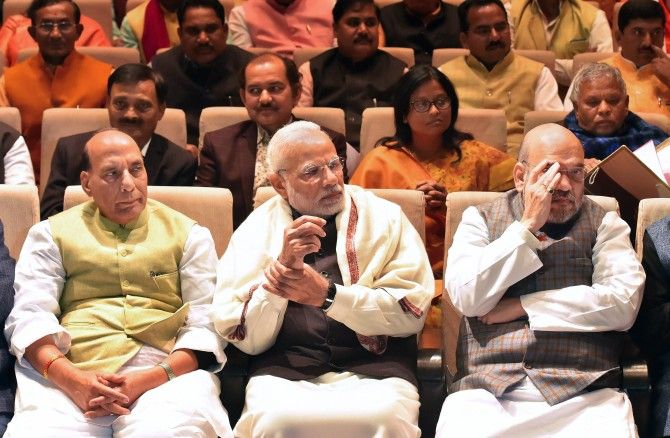 | « Back to article | Print this article |
'If anything, he is a fiscal hawk.'
'He has avoided fiscal profligacy completely for the past four years.'
'The fiscal deficits since 2014 are clear proof of this.'
'The point is not that it is not 3 per cent yet; it is that it is not 6, 7 or 8 per cent, which it could easily have been.'
'For this he needs to be congratulated.'
'He has recognised it no longer pays to spend other people's money to win elections,' points out T C A Srinivasa-Raghavan.

IMAGE: Prime Minister Narendra D Modi -- flanked by Bharatiya Janata Party President Amit A Shah, to his left, and Home Minister Rajnath Singh -- at the BJP Parliamentary Party meeting in New Delhi, February 1, 2018. Photograph: Atul Yadav/PTI Photo
Budgets are to urban Indians what litfests are to authors.
Or, to misquote a perfectly vile man called Winston Churchill, never is so much spoken about so little by so many people.
This is particularly true of the 2018 Budget.
That said, the government must be congratulated on not having taken the well-trodden route that previous governments have tended to take before a general election.
So although scores of new schemes have been announced with the rural vote in mind, especially rural women, the overall allocation to these is not alarming.
Indeed, in some cases like the medical insurance scheme for 500 million people, it is entirely missing.
But, as perhaps is the intention, the prime minister and the finance minister have given their candidates several talking points when they go campaigning.
To that extent this one can be called an election Budget.
Next year would have been too late for any major political impact. In fact, after seeing the by-election results in Rajasthan, where the BJP has been trounced, some would say it is too late even now.
Be that as it may, the comforting truth is that over the last four years Prime Minister Narendra D Modi has restored the original purpose of the Budget -- jettisoned by Indira Gandhi in 1970 -- to raise revenue in small bits and to spend, perhaps wisely, in small bits.
This is a good thing.
Barring Charan Singh's in 1979 and Rajiv Gandhi's during 1986 and 1989, all Indian governments have been very careful about macro balances and the health of the fisc.
Mr Modi is not an exception. If anything, he is a fiscal hawk.
He has avoided fiscal profligacy completely for the past four years.
The fiscal deficits since 2014 are clear proof of this. The point is not that it is not 3 per cent yet; it is that it is not 6, 7 or 8 per cent, which it could easily have been.
For this he needs to be congratulated. He has recognised it no longer pays to spend other people's money to win elections.
Budgets have two parts. Part A is meant to be forgotten. The last 48 years have shown that it has no real value, neither economic nor political.
Part B is the operative part and is remembered by those who pay tax. Thus, punters in the stock market will now have to pay a long-term capital gains tax of 10 per cent.
This is a good thing except that there is an element of retrospective taxation here, which could have been avoided.
Rich people will now be taxed more. They will pay nearly 36 per cent, up from around 32 per cent in 2014. This too is a good thing.
The middle class -- senior citizens excluded, for them there is a small bonanza -- has got very little.
This is a bad thing both politically and economically because if the economy is to grow, the middle class needs to spend more. It can't do this if the government takes away ever larger chunks of its income.
Politically also it is a bad thing as well. Mr Modi should not be surprised to see middle class support in 2019 dipping sharply.
The reason for this is the government's focus on tax revenue, while ignoring non-tax revenue.
Many people had thought that Mr Modi would fix this problem, but in the four years he has been prime minister he has not even tried to do so.
It is hard to escape the conclusion that he lacks the political courage for it.
Meanwhile, as the Rajasthan by-election results show, farmers are already very annoyed. This Budget promises a lot to them, but...
The big vote-getting move is the promise of medical insurance -- copied from Rajasthan -- for 500 million people.
The political impact of this scheme for the BJP, Mr Modi hopes, will be like the MGNREGA's was for the Congress.
Its economic cost, however, remains a mystery, perhaps never to be solved.
The devil in insurance lies in the detail. In the absence of cast-iron rules, the only way contracts are enforced is via corruption.
There are some other eye-catching tweaks, such as the reduction to 25 per cent in the tax rate for companies with turnovers up to Rs 2.50 billion.
This, as the finance minister said, should help them invest more.
Whether they will depends on the availability of credit from banks, of which as yet there isn't much hope.
For the rest, this movie is over; go watch a new one this weekend. Or the cricket.